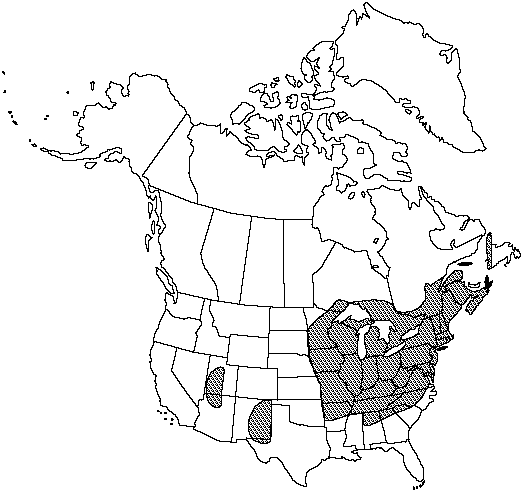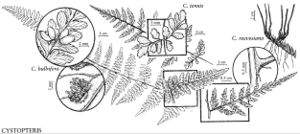Difference between revisions of "Cystopteris bulbifera"
Neues J. Bot. 1(2): 10. 1805.
imported>Volume Importer |
RevisionBot (talk | contribs) m (Bot: Adding category Revised Since Print) |
||
| Line 106: | Line 106: | ||
}}<!-- | }}<!-- | ||
| − | -->[[Category:Treatment]][[Category:Cystopteris]] | + | --> |
| + | |||
| + | [[Category:Treatment]] | ||
| + | [[Category:Cystopteris]] | ||
| + | [[Category:Revised Since Print]] | ||
Latest revision as of 14:29, 15 December 2020
Stems creeping, not cordlike, internodes very short, less than 0.5 cm, heavily beset with old petiole bases, hairs absent; scales uniformly brown to somewhat clathrate, lanceolate, radial walls brown, luminae clear. Leaves monomorphic, clustered at stem apex, to 75 cm, seasonally bearing sori (earliest leaves lack sori, subsequent leaves with sori). Petiole reddish when young, usually green or straw-colored throughout (occasionally darker) in mature specimens, shorter than blade, base sparsely scaly. Blade broadly to narrowly deltate, 2-pinnate to 2-pinnate-pinnatifid, almost always widest at base, apex long-attenuate; rachis and costae usually densely covered by unicellular, gland-tipped hairs, often with bulblets; axils of pinnae occasionally with multicellular, gland-tipped hairs. Pinnae mostly perpendicular to rachis, not curving toward blade apex, margins serrate; proximal pinnae pinnate-pinnatifid to pinnatifid, ± equilateral, basiscopic pinnules not enlarged, basal basiscopic pinnules sessile to short-stalked, bases truncate to obtuse; distal pinnae ovate to oblong. Veins directed into notches. Indusia cupshaped, apex truncate, typically invested with unicellular, gland-tipped hairs. Spores spiny, usually 33–38 µm. 2n = 84.
Phenology: Sporulating summer–fall.
Habitat: Cracks and ledges on cliffs, rarely terrestrial, usually on calcareous substrates
Elevation: 0–2500 m
Distribution

N.B., Nfld. and Labr. (Nfld.), N.S., Ont., Que., Ala., Ariz., Ark., Conn., Del., Ga., Ill., Ind., Iowa, Ky., Maine, Md., Mass., Mich., Minn., Mo., N.H., N.J., N.Mex., N.Y., N.C., Ohio., Pa., R.I., S.C., Tenn., Tex., Utah, Vt., Va., W.Va., Wis.
Discussion
Cystopteris bulbifera usually occurs on moist calcareous cliffs, but it also grows on rock in dense woods and occasionally occurs terrestrially in northern swamps. Blades on most individuals are narrowly deltate and distinctively long-attenuate. The rachises, costae, and indusia are densely beset with gland-tipped, unicellular hairs. Mature specimens often have deciduous bulblets. These characteristics readily distinguish C. bulbifera from other diploid species.
Hybridization and allopolyploidy involving Cystopteris bulbifera and other North American Cystopteris species have generated several species. In the eastern portion of its range, C. bulbifera and C. protrusa are the diploid progenitors of the tetraploid C. tennesseensis (C. H. Haufler et al. 1990). In northeastern North America, C. bulbifera has hybridized with tetraploid C. fragilis, ultimately resulting in the hexaploid C. laurentiana (R. F. Blasdell 1963). In the southwest, the diploid C. reevesiana and disjunct representatives of C. bulbifera are the progenitors of the tetraploid C. utahensis (C. H. Haufler and M. D. Windham 1991). In addition to these fertile allopolyploids, sterile hybrids are also possible when C. bulbifera is sympatric with its polyploid derivatives. Sterile hybrids between C. bulbifera and C. tennesseensis have been identified from several localities. Cystopteris bulbifera may hybridize with C. tenuis to form C. × illinoensis (C. H. Haufler et al. 1990; R. C. Moran 1982b). Diploid sexual C. bulbifera may be distinguished from these allopolyploid species and sterile hybrids because the hybrid-derived taxa (1) will normally have less prominent glandular hairs, (2) will have misshapen bulblets, (3) will more likely have blades that are widest above the base, and (4) will have large spores (in sexual allopolyploids) or malformed spores (in sterile hybrids).
Selected References
None.
Lower Taxa
"widest" is not a number."/3-3timeslengthofblades" is not declared as a valid unit of measurement for this property.
